Documentation:CTLT programs/Indigenous Initiatives/Resources
CTLT Indigenous Initiatives works to promote, support, and develop research projects that demonstrate an accurate and developed understanding of Indigenous histories, cultures, and perspectives.
Below are some of the projects we manage, support, and/or develop:
What I Learned in Class Today: Aboriginal Issues in the Class
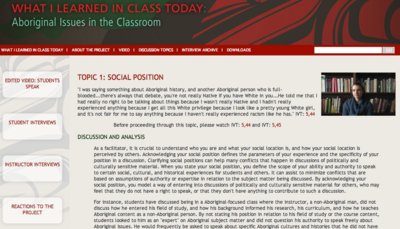
Link: http://www.whatilearnedinclasstoday.com
Classrooms, especially classrooms at major institutions like UBC, are becoming increasingly diverse and require attention in order to have effective cross-cultural discussions. This project works to improve the conversations around politically and culturally sensitive issues in a classroom by asking: how does cultural communication happen in a classroom, and how can it be improved?
This project examines the classroom experiences of students, instructors, and administrators at UBC in order to make these problems visible, to better understand how difficulties arise, and to find ways for more professional and productive classroom discussions. The project clearly identified the complexities and challenges of classroom conversations involving contentious cross-cultural discussions, and in specific discourse around Indigenous curriculum.
Indigenous Foundations
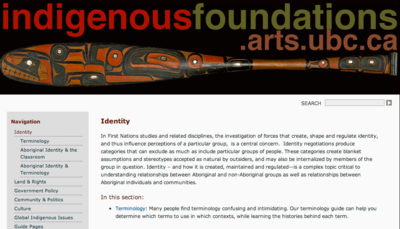
Link: http://indigenousfoundations.arts.ubc.ca
Students enter university with differing levels of knowledge about Indigenous issues. This makes it difficult to have meaningful discussions on Indigenous topics beyond an introductory level. Indigenous Foundations is a website project developed by the First Nations Studies Program. It provides an accessible starting point for instructors, researchers, and students in any discipline who want to learn more about Indigenous cultures, politics, and histories.
The information presented is concise and easily digestible, while still conveying the depth and complexities of the topics. Indigenous Foundations incorporates learning tools such as video interviews and other multimedia outlets to create an engaging resource.
Time and Place at UBC: Our Histories and Relations

Link: http://timeandplace.ubc.ca
Time and Place at UBC: Our Histories and Relations documents UBC’s key historical moments with Indigenous peoples, while locating these moments in broader contexts at institutional, provincial, and national levels (i.e., UBC, BC, and Canada). Although the special focus of the timeline is on Indigenous peoples, it is not only about them, nor is it only about the past. Rather, the timeline intends to speak to us all – Indigenous and non-Indigenous peoples alike at UBC – to build a shared understanding of the specificities and complexity of the time and place that we share today.
Specifically, the timeline aims to: 1) develop our awareness of the history of this place at UBC, on the traditional, ancestral, and unceded territory of the Musqueam people; and 2) offer a historical lens through which we reflect on our relations at UBC by allowing us to embed ourselves in the multiple historical layers of this place.
The timeline is not a static and exhaustive list of historical events in Canada or of Indigenous peoples, and it continues to be work in progress. We welcome your input and collaboration on the project.
If interested, please contact Hanae Tsukada at hanae.tsukada@ubc.ca.
Decolonizing Knowledge
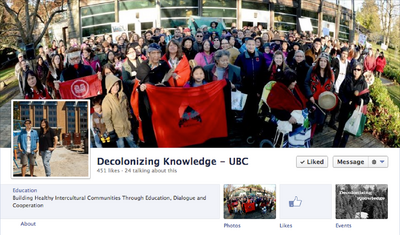
Link: http://www.facebook.com/DKUBC
Decolonizing Knowledge is a student-led initiative, started by Sarah Ling and Spencer Lindsay, that develops strategies to reconcile cultural misrepresentation and appropriation that happens at UBC. It builds intercultural relationships and partnerships between campus organizations and Indigenous communities, and shares educational resources. Decolonizing Knowledge seeks to equip staff, students, administration, and faculty with the tools necessary to create a UBC campus that is welcoming to all.
In 2011, Sarah and Spencer led a community-based naming process and committee to name two new buildings at the first-year student dormitory called Totem Park Residence. Through consultation with Musqueam and UBC Student Housing and Hospitality Services (SHHS), and dialogues with other campus units and students, the new buildings are now named after significant Musqueam sites, həm̓ləsəm̓ and q̓ələχən. They also worked with SHHS to include information about all house names at Totem Park Residence on their website. To educate students and staff about the importance of acknowledging local Indigenous history, they've facilitated dialogues, led staff training sessions and student walking tours, helped organize student events, and met with individuals seeking advice for their own initiatives.
Sarah and Spencer continue to share what they learned from the naming process and are exploring ways to create sustainable educational resources that showcase Indigenous history through UBC’s relationships with local Indigenous nations.
Sarah, in collaboration with Indigenous Initiatives, Centre for Teaching, Learning and Technology, is producing an educational film series about all the house names in use at Totem Park Residence.
In June 2014, Sarah and Spencer helped to create Knowing the Land Beneath Our Feet - an Indigenous walking tour initiative for UBC-Vancouver, in collaboration with the First Nations and Indigenous Studies Program, Coordinated Arts Program, and CTLT Indigenous Initiatives. They welcome your questions, ideas, and inquiries.
Totem Park Residence Educational Film Series
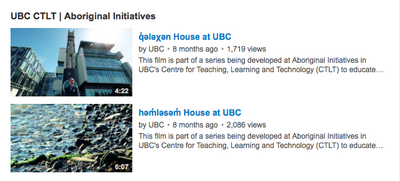
Link: https://www.youtube.com/playlist?list=PLG5UGIHVtlPSf2EFBRUSoHtlJAd0E8EOn
Read an article about the educational film series.
This film series reveals the historical context of the site known today as Totem Park Residence, the contested history of its building naming processes, and stories of UBC-Indigenous relations.
The first two films about the həm̓ləsəm̓ and q̓ələχən Houses were launched on February 19, 2014, and are available through the UBC CTLT Aboriginal Initiatives playlist on UBC's YouTube Channel. They feature Larry Grant and Wayne Point from Musqueam.
The next six films about the original six house names, chosen without community consolation in the 1960s, will be launched by January 2016.
Project Lead, Production Coordinator, and Producer: Sarah Ling.
Director/Editor: Alejandro Yoshizawa.
For inquiries or comments, please contact Sarah at sarah.ling@ubc.ca.
Knowing the Land Beneath Our Feet

Link: http://fnsp.arts.ubc.ca/research-resources/knowing-the-land-beneath-our-feet
UBC-Vancouver is rich in Indigenous history and presence, but for many students, faculty, staff, and visitors, this history and presence is invisible. Many of the Indigenous names, artwork, and architecture across campus denote important relationships between campus units and local First Nations, and all provide the occasion to think about our history together in this place. They tell stories, encode values, and point the way to respectful relationships with local First Nations, and to better understanding of our presence on Musqueam land.
"Knowing the Land Beneath Our Feet" is a multimedia initiative aimed at bringing these stories and histories to light to teach students, faculty, staff, and visitors alike about their responsibility to uphold the relationships signified by these pieces. Project leads Sarah Ling and Spencer Lindsay are partnering with the First Nations Studies Program (FNSP) and Coordinated Arts Program (CAP) to create curriculum materials that incorporate their walking tour into sustainable lesson plans that enable students to experience what it means to be on the traditional, ancestral, and unceded territory of the hən̓q̓əmin̓əm̓-speaking Musqueam people. Sarah and Spencer are also creating a digital tour on a web interface developed by UBC Digital Media Technologies, so that anyone can access information about the many house posts, totem poles, signs, and other sites of this tour. This initiative is supported by the 2014 UBC Equity Enhancement Fund and the First Nations Studies Program. It will be piloted with FNSP and CAP classes and user groups throughout the Spring of 2015. Implementation and a public launch will follow.
Contact Us:
Email Sarah Ling at sarah.ling@ubc.ca for instructional-based and general inquiries.
Email Spencer Lindsay at spencerjlindsay@gmail.com for media inquiries.
Project Team:
Sarah Ling
Educational Developer, TLEF 2015-16
MA Candidate, Interdisciplinary Studies Graduate Program
Spencer Lindsay
MA, School of Community and Regional Planning
Dr. Daniel Heath Justice,
First Nations Studies Program Chair,
Associate Professor, FNSP and English
Dr. David Gaertner,
First Nations Studies Program Postdoctoral Fellow and Instructor
Dr. Kathryn Grafton,
Coordinated Arts Program Co-Chair and Instructor, Department of English
Dr. Evan Mauro,
Coordinated Arts Program Sessional Lecturer and Stream Leader
Amy Perreault, Strategist, Indigenous Initiatives, Centre for Teaching, Learning and Technology
Where Are We in The World?
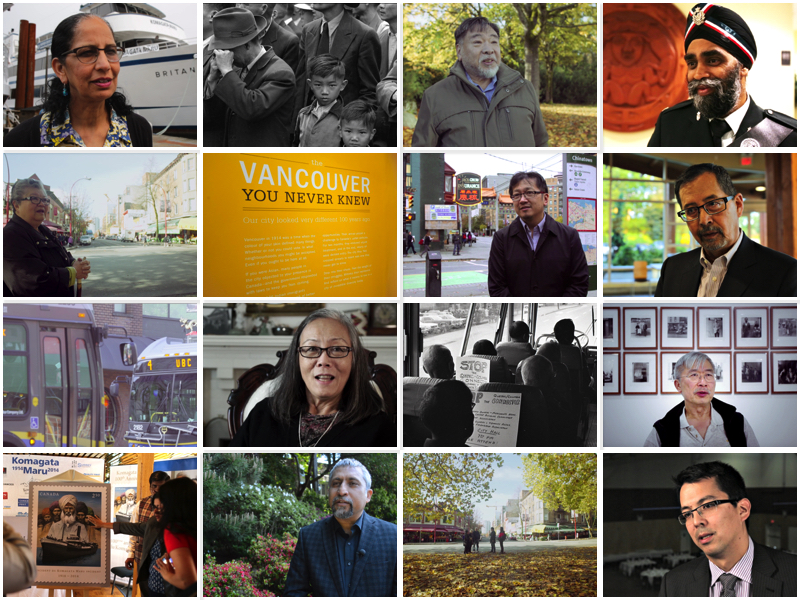
"Where Are We in the World?" is a series of films that feature sites around the Lower Mainland shaped by often ignored or hidden histories of struggle and agency. The focus of this new initiative is to provide a strong foundation experientially to answer the question of “where” we are in terms of UBC and Vancouver as places on unceded Musqueam, Squamish, and Tsleil-Waututh territories.
The first two films in this series introduce Vancouver's Chinatown as a contested space and the Komagata Maru Incident of 1914. They are called "Chinatown in the Making of Vancouver" and "Who Welcomes Immigrants to this Land?".
This initiative is a partnership between St. John’s College and Indigenous Initiatives – Centre for Teaching, Learning and Technology. It is funded by the 2014-2015 UBC Equity Enhancement Fund.